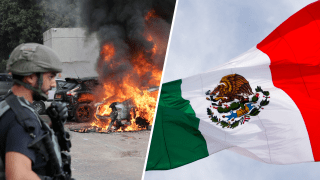
The war in Israel is driving global geopolitics, and this inevitably affects Mexico. The polarization of blocs internationally has reduced the room to manipulate the politics of neutrality with which Mexican President Andrés Manuel López Obrador has played to avoid U.S. interference in Mexico’s domestic affairs, for example, in exchange for the carrying the weight of the U.S. anti-immigrant and fentanyl strategies.
The complicated bilateral agenda with the U.S. is falling prey to the “border security” policy that has stirred up Republican anti-immigrant rhetoric and pulled in the Democrats over the failures and errors with regard to the Hamas attack on Israel. Since Donald Trump’s presidency, the “wall” in Palestine has had a major influence on the politics of immigration in the U.S. The governor of Texas has defended the U.S. wall, and President Joe Biden has been forced to reactivate it. Since the 9/11 terrorist attack in New York in 2001, the security agenda has permeated the approach to the border and the risk of U.S. losing control.
The policy of not taking sides in war in the hope of staying out is difficult, even though pacifism is fundamental to international law. It can get harder if international pressure ramps up the tension, or when reports of human rights violations involving domestic migrants mount up. The problem involves programs like the “Remain in Mexico” policy that the Lopez Obrador government entered into with the U.S. in 2019 employing the National Guard to contain the flow of migrants.
The war in Israel and Gaza creates a predicament for a neutrality policy and for the agenda with the U.S. in at least two respects. The brutal attack against Israel and Benjamin Netanyahu’s ferocious response are the result of Hamas’ terrorism as much as Israeli political fundamentalism. But neutrality dissolves when war crimes are committed against civilians. Israel has objected to Lopez Obrador’s “neutrality,” which Israel equates with support for terrorism. But this is not a claim for humanitarianism; rather it is about a taking a political stand to condemn the extreme violence of the Israeli defense force in its attempt to overwhelm and obliterate the Palestinians.
A strong position would also have to include the condemnation of acts which exceed international law, such as suffocating the people of Gaza and the disproportionate use of force in Israel’s all-out offensive. Accordingly, calling for the unequivocal protection of civilians – as requested by Mexican Foreign Minister Alicia Bárcena – undermines neutrality. The war puts Mexico in a risky position in the realignment of blocs and in the management of the “border security” agenda. But if the unilateral policies in the face of the refugee crisis have been difficult to bear, now the panorama of insecurity on European and Israeli borders will further complicate the agreements. The shock wave of the war will give ammunition to Congress, governors and Republican extremists, reinforcing their strong positions. Biden has already had to reactivate Trump’s wall as a condition for Mexico’s support for supplying arms to Ukraine. The instability in the Middle East will harden radical positions in the face of the unstoppable flow of migrants and fentanyl traffic as a matter of “national security” at the core of the bilateral agenda.
Israel’s evident failure to secure its borders as part of its policy to isolate the Palestinians despite the unequal nature of technological resources and weapons is a crushing blow to the image of Israel’s powerful army and the efficiency of its intelligence apparatus. We have to remember that Netanyahu himself encouraged Trump to build the wall on the border with Mexico because it had worked well for the Israelis.
So, Israel’s lessons are already part of the discussion among political rivals in the U.S. about the political cost of repression. Biden’s decision now merely looks like the prelude to an intense confrontation between Democrats and Republicans about the most efficient means to control migration,in light of the debate between the “pacifists” and the “sovereigntists,” which the parties are increasingly finding irrelevant.
The wiggle room for Mexico will get smaller in an agenda dominated by “border security” and anti-immigrant campaigns. The nationalist genie gets new life outside the bottle with the reactivation of the wall as evidence of how such nationalism is infecting U.S. politics.

Leave a Reply
You must be logged in to post a comment.